LGBT Legislative Hopefuls across the nation – The Election Issue
Meet the 14 LGBT candidates you should watch for on Election Day
By John Riley on November 3, 2016 @JRileyMW
 In politics, the saying goes, if you’re not at the table, you’re on the menu. It’s an adage entirely appropriate for the LGBT community, often attacked by politicians at every level of government without the political means to defend itself.
In politics, the saying goes, if you’re not at the table, you’re on the menu. It’s an adage entirely appropriate for the LGBT community, often attacked by politicians at every level of government without the political means to defend itself.
While the support of straight political allies has been essential to advancing equality, having an LGBT voice present at negotiations can significantly alter the dynamic. Getting LGBT people into the decision-making process is the best way to ensure our rights are protected and extended.
Still, there has been a sea-change in how influential the LGBT community has become in little more than a decade. Same-sex couples were the “bogeyman” of the 2004 election. Twelve years later, and both Clinton and Trump are making direct appeals to the our community.
The Victory Fund, which helps LGBT candidates reach political office, has endorsed 147 candidates for political office this cycle. We asked the organization to highlight ten candidates in races that are being closely watched as voters across the country head to the polls come Nov. 8.
“These spotlight candidates have the opportunity to make an outsized impact on equality,” says Elliot Imse, the organization’s communications director. “What that usually means is they are running for a high office, such as governor, U.S. Senator or U.S. Congressperson. Or it means they are running in a state with few or no LGBT lawmakers, or in low-equality states — states where they could make a real difference if they were elected and able to influence policy legislation.”
VICTORY FUND CANDIDATES
Jim Gray
Office Sought: U.S. Senate
State: Kentucky
The idea that Kentucky, one of the 10 most religious states in the country according to Gallup, would have an LGBT candidate running for Congress is breathtaking. Yet former Lexington Mayor Jim Gray is doing better than many had hoped in his bid for former presidential candidate Rand Paul’s Senate seat. Were Gray to pull off the upset, he would become the second openly LGBT senator in history, after Wisconsin’s Tammy Baldwin. “Traditionally, conservative states usually don’t put forward statewide LGBT candidates,” says Imse. “It’s been particularly interesting because the fact that Jim Gray is LGBT has really not been the focus of many of the attack ads … [and he] has an appealing message that has been resonating well with the people of Kentucky.”
Matt Heinz
Office Sought: U.S. House
State: Arizona
Heinz, a physician and former state representative, is seeking the congressional seat once held by U.S. Rep. Gabrielle Giffords. The district’s Republican incumbent, Martha McSally, is a first-term representative who won her seat by only 167 votes. That’s why Democrats are aggressively targeting the district, and believe Heinz is essential in their efforts to take back the House. “Arizona is a ‘low-equality’ state,” says Imse. “And we know that the more LGBT lawmakers we have from low-equality states, the more likely it is that LGBT equality pushes forward.” Were he to win, Heinz would become only the third openly LGBT representative from Arizona, after U.S. Rep. Kyrsten Sinema and former congressman Jim Kolbe, who held this very seat.
Angie Craig
Office Sought: U.S. House
State: Minnesota
If Democrats ever hope to gain control of the House, they must win Minnesota’s 2nd Congressional District. There, businesswoman Angie Craig is running against Jason Lewis, a conservative radio host nicknamed “mini-Trump” for his comments about women, LGBT people, and people of color. “It’s incredibly important that Angie Craig wins,” says Imse, “not just for LGBT people, but for all Americans, because Jason Lewis is opposed to equality for all people. [Angie] is an incredible candidate, she’s done extremely well, and is a ‘natural’ in a lot of ways, and we think she’ll be victorious.”
Denise Juneau
Office Sought: U.S. House
State: Montana
Denise Juneau, who currently serves as State Superintendent of Public Instruction in Montana, became the first Native American woman elected to statewide office in her 2008 victory. She hopes to reach the same milestone on a national level. While most Democrats would write off deep-red Montana as a lost cause — let alone one who is lesbian — Juneau has garnered a lot of attention during the course of her campaign. Notably, incumbent Ryan Zinke, who should really have no trouble coasting to reelection, has begun attacking Juneau aggressively in ads. This may indicate that he believes the race is closer than expected. Imse says a Juneau victory would be significant, as Montana is another “low-equality” state that lacks legal protections for LGBT people.
Brady Piñero Walkinshaw
Office Sought: U.S. House
State: Washington
Due to the nature of Washington State’s primary, two Democrats will face off for the Seattle-based 7th Congressional District. One of those candidates, Brady Walkinshaw, would be the first LGBT Latino member of Congress if elected. “Brady would bring a progressive voice to Congress, but would be concerned about issues other than LGBT rights,” says Imse. “He would be an important voice for a lot of progressive causes that many LGBT people care about, including the environment, climate change, and gun violence prevention.” Despite his political record, Walkinshaw may have an uphill battle among die-hard liberal voters: his opponent, fellow State Rep. Pramila Jayapal, has the backing of Bernie Sanders.
Tina Podlodowski
Office Sought: Secretary of State
State: Washington
Despite its Democratic tilt, Washington’s Secretary of State has been Republican since 1964. Some people even consider the office a Republican “legacy seat.” But Democrat Tina Podlodowski has no intention of letting incumbent Kim Wyman coast to reelection. Podlodowski would become one of only a handful of LGBT people to be elected to such a high-ranking position in any state. “Tina is very much focused on voting rights, civil rights, and ensuring that all Washingtonians are able to access the ballot box,” says Imse. “About a month ago, we also found out that the Secretary of State’s office, under Kim Wyman’s leadership, allowed some voter website data to be vulnerable to hackers. While there’s no evidence it was hacked, [Tina’s campaign] discovered the vulnerabilities, and quickly alerted the proper people so it could be fixed.”
Tommy Greene
Office Sought: State House
State: Ohio
Ohio is one of the states where Democrats have been gerrymandered into an almost permanent minority. But an open seat in the Cleveland area could be a small step on the party’s journey back from the political wilderness. Tommy Greene, who previously worked for Equality Ohio, is facing off against Dave Greenspan in one of the Democratic Legislative Campaign Committee’s “Essential Races” of 2016. “[Greene] would be only the second LGBT representative in the state legislature, so he could make a significant impact in the state,” says Imse. “Ohio is a swing state that should have more protections for LGBT people than it does.”
Jane Campbell
Office Sought: State House
State: North Carolina
A 25-year retired Navy veteran, Jane Campbell was prompted to run for the State House after her representative, John Bradford III, helped to draft, sponsor and pass North Carolina’s anti-LGBT HB 2 law. She has made repealing the law one of her major priorities, and hopes to pass legislation to provide greater statewide protections to the LGBT community if elected. “If elected, Jane would become the only LGBT representative in the state legislature, which makes this race especially significant,” says Imse. He adds that Campbell’s presence would provide a missing voice from a community that has been ignored and, most recently, targeted by state lawmakers pushing an anti-LGBT agenda.
Beth Tuura
Office Sought: State House
State: Florida
Currently, Florida only has one openly LGBT lawmaker, but Victory Fund hopes to quintuple that number this year, including backing Beth Tuura in the race for an Orlando-area House seat. “Her district is home to Pulse nightclub, so it’s incredibly significant to have an openly LGBT candidate running in District 47, where a few months ago the LGBT community faced one of the biggest massacres in its history,” says Imse. “She’s running against an incumbent who’s a big supporter of the NRA, and that has become one of the signature issues in the campaign. Beth is running so she can go to Tallahassee and put forward gun violence prevention measures, as well as emphasizing women’s health and LGBT equality at the state level.”
Ken Keechl
Office Sought: State House
State: Florida
Another Florida candidate, Ken Keechl is running in a Fort Lauderdale-based district. Keechl was Broward County’s first openly gay county commissioner when he won his seat in 2006, where he helped push through LGBT nondiscrimination protections. He faces an uphill battle, running in a GOP-leaning district against incumbent George Moraitis, who has a long record of anti-LGBT positions. A win for Keechl would be significant, says Imse, because he has a strong history of pushing forward equality legislation, and, even more importantly, getting it passed.
Running Red
Few have been more vocal about the need for bipartisan support for pro-LGBT legislation than the Log Cabin Republicans. Their president, Gregory T. Angelo, is fond of pointing out that many of the LGBT community’s significant victories have been achieved only when advocates work with their conservative brethren — including the repeal of “Don’t Ask, Don’t Tell,” the overturn of the Defense of Marriage Act, and the Senate passage of the Employment Non-Discrimination Act.
This election cycle, Log Cabin has endorsed 22 candidates for election or reelection, in an effort to grow the ranks of pro-equality Republicans in Congress. Two of those candidates — Paul Babeu in Arizona and Clay Cope in Connecticut — are openly gay, and, if victorious, would become the first out LGBT Republicans to be elected to Congress.
Babeu, a sheriff in Pinal County, Ariz., is seeking an open seat in Congress that covers the bulk of eastern Arizona. Cope is the first selectman of the town of Sherman, Conn. — a position he has been elected to multiple times — and initially beat a long-serving Democratic incumbent to win the seat. He is now challenging Rep. Elizabeth Esty for her northwestern Connecticut seat.
“In both Babeu and Cope, you have openly gay Republicans who have already won elections,” says Angelo. “They are proven commodities. They haven’t come out of the blue and decided to run for office. You see they’re ‘proven,’ in that voters believe in and support both candidates to vote them into office time and again. They are not running just to be the ‘gay Republican’ member of the House of Representatives,” Angelo says. “They are running because they want to be change agents in Washington, D.C., and represent the people of their district, who have had representation by Democrats exclusively for some time. And by Democrats who have towed a liberal line, rather than keeping the best interests of their district at heart.”
Uphill Battle
It would be remiss to omit the presence of two transgender women on Tuesday’s ballot. Democrat Misty Snow, running in Utah, is challenging Sen. Mike Lee, a favorite of the Tea Party. Democrat Misty Plowright, running in Colorado’s 5th Congressional District, is taking on U.S. Rep. Doug Lamborn, another anti-LGBT conservative. Both women are running in areas historically hostile to Democrats.
Given the uphill nature of their bids, it’s not surprising that neither has been endorsed by national LGBT organizations like the Human Rights Campaign or the Victory Fund. But Mara Keisling, executive director of the nonpartisan National Center for Transgender Equality, says both women should be praised for stepping into the political fray.
“If they were to win, it would be amazing,” she says. “It would mean whenever people were talking about us, there’d be one of us at the table. That’s always spectacular…. That they were gutsy enough to stand up is great, and hopefully it will inspire other candidates to run in the future.”
[ninja-popup id=73197]
Trump Viciously Attacks Trans Community in Congress Speech
President Trump called transgender identity a "big lie" and flaunted his orders restricting trans health care and sports participation.
By John Riley on March 5, 2025 @JRileyMW
President Donald Trump used his address to Congress on Tuesday, March 4, to attack transgender individuals, calling transgender identity a "lie" and railing against transgender athletes, gender-affirming care, and trans visibility in the military and more broadly within society.
At one point during the speech, Trump switched from speaking about a child who was diagnosed with cancer to claim his administration was protecting children from "toxic ideologies" in schools.
He brought up the story of January Littlejohn, a Florida anti-transgender activist who sued the Leon County School District in Tallahassee, Flordia, in 2021, alleging that her child's school had discussed restrooms and name change requests with the child, assisting her in "socially transitioning" without informing Littlejohn or her husband of their efforts.
Pentagon Begins Forcibly Discharging Trans Service Members
A Pentagon memo outlines how the Department of Defense will implement Trump's ban on trans service members, with most discharged in 60 days.
By John Riley on February 27, 2025 @JRileyMW
The Pentagon will start forcibly discharging transgender service members within 60 days unless an individual can obtain a special waiver to allow them to continue serving.
On Wednesday, February 26, the Pentagon issued a policy memo outlining how the U.S. Department of Defense is complying with an executive order by President Trump to prohibit transgender individuals from serving openly in the U.S. military.
Trump's executive order claims that allowing transgender people to serve in the Armed Forces threatens military readiness and undermines unit cohesion.
It contradicts a 2016 RAND Corporation study, commissioned by the Pentagon, that found allowing transgender members to serve openly had no negative impact on unit cohesion, operational effectiveness, or readiness.
Philadelphia Schools Defy Trump Trans Athlete Ban
The School District of Philadelphia will refuse to comply with President Trump's order to bar transgender athletes from female sports.
By John Riley on March 3, 2025 @JRileyMW
The School District of Philadelphia announced it will defy President Donald Trump's executive order prohibiting transgender athletes from competing in women's sports.
This move contrasts with the actions of the Pennsylvania Interscholastic Athletic Association, the governing body of K-12 sports in the Keystone State.
The PIAA revised its policy to comply with Trump's executive order, replacing references to a student's "gender" with sex. It removed principals' authority to make a final determination regarding a student's sex and allowed a school to determine it (presumably based on the gender marker on school records and birth certificates, although the policy lacks specifics).
Support Metro Weekly’s Journalism
These are challenging times for news organizations. And yet it’s crucial we stay active and provide vital resources and information to both our local readers and the world. So won’t you please take a moment and consider supporting Metro Weekly with a membership? For as little as $5 a month, you can help ensure Metro Weekly magazine and MetroWeekly.com remain free, viable resources as we provide the best, most diverse, culturally-resonant LGBTQ coverage in both the D.C. region and around the world. Memberships come with exclusive perks and discounts, your own personal digital delivery of each week’s magazine (and an archive), access to our Member's Lounge when it launches this fall, and exclusive members-only items like Metro Weekly Membership Mugs and Tote Bags! Check out all our membership levels here and please join us today!
The Magazine
-
Most Popular
 'Porn Star University' Started by Gay-for-Pay Creator Andy Lee
'Porn Star University' Started by Gay-for-Pay Creator Andy Lee  Trump Targets Law Firm for Defending Transgender Rights
Trump Targets Law Firm for Defending Transgender Rights  Montana Governor Signs Anti-Trans Bills into Law
Montana Governor Signs Anti-Trans Bills into Law  Classical & Choral Music: Spring Arts Preview 2025
Classical & Choral Music: Spring Arts Preview 2025  Anheuser-Busch Abruptly Ends Sponsorship of St. Louis PrideFest
Anheuser-Busch Abruptly Ends Sponsorship of St. Louis PrideFest  Bea Arthur's Air Force Bio Purged by Department of Defense
Bea Arthur's Air Force Bio Purged by Department of Defense  Film: Spring Arts Preview 2025
Film: Spring Arts Preview 2025  Priyanka Shetty On Her Incisive New Solo Play '#Charlottesville'
Priyanka Shetty On Her Incisive New Solo Play '#Charlottesville'  Gay Porn Star Tim Kruger Dead at 44
Gay Porn Star Tim Kruger Dead at 44  Broadway: Spring Arts Preview 2025
Broadway: Spring Arts Preview 2025
 Film: Spring Arts Preview 2025
Film: Spring Arts Preview 2025  Classical & Choral Music: Spring Arts Preview 2025
Classical & Choral Music: Spring Arts Preview 2025  Broadway: Spring Arts Preview 2025
Broadway: Spring Arts Preview 2025  Gallery: The Emotionally Sensual Artwork of Soltian
Gallery: The Emotionally Sensual Artwork of Soltian  Montana Governor Signs Anti-Trans Bills into Law
Montana Governor Signs Anti-Trans Bills into Law  Above & Beyond: Spring Arts Preview 2025
Above & Beyond: Spring Arts Preview 2025  Trump Targets Law Firm for Defending Transgender Rights
Trump Targets Law Firm for Defending Transgender Rights  Priyanka Shetty On Her Incisive New Solo Play '#Charlottesville'
Priyanka Shetty On Her Incisive New Solo Play '#Charlottesville'  'Sister Act' at Ford's is a Heavenly Good Time
'Sister Act' at Ford's is a Heavenly Good Time  Popular Music: Spring Arts Preview 2025
Popular Music: Spring Arts Preview 2025
Scene
Metro Weekly
Washington's LGBTQ Magazine
P.O. Box 11559
Washington, DC 20008 (202) 638-6830
About Us pageFollow Us:
· Facebook
· Twitter
· Flipboard
· YouTube
· Instagram
· RSS News | RSS SceneArchives
Copyright ©2024 Jansi LLC.






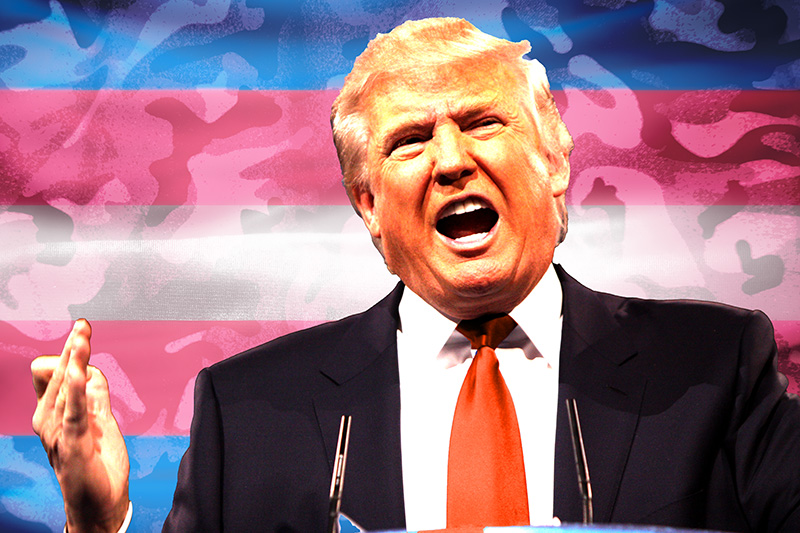

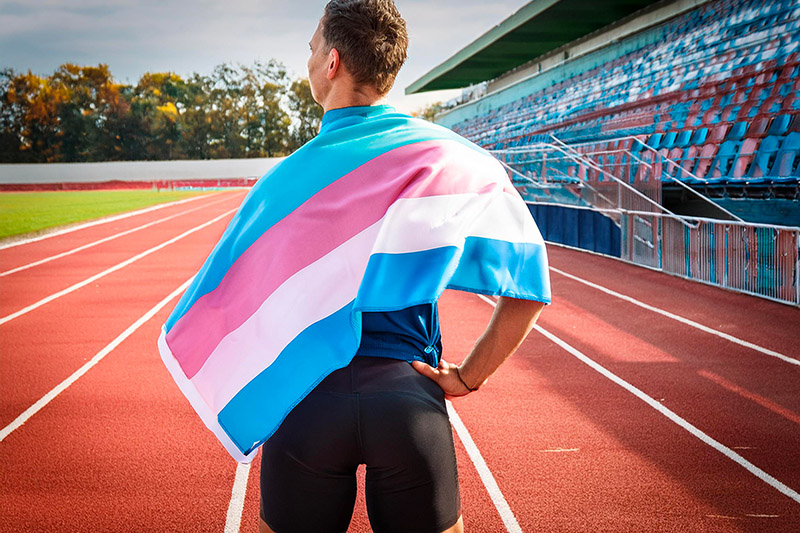
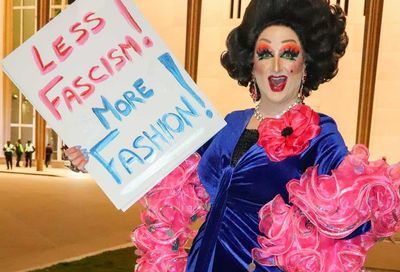
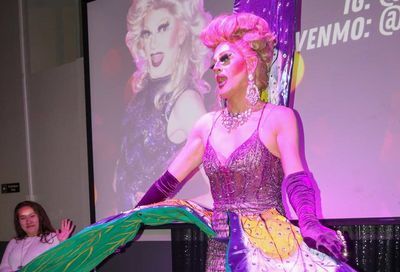
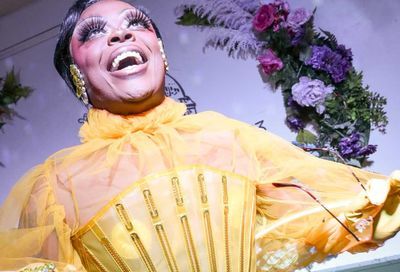
You must be logged in to post a comment.